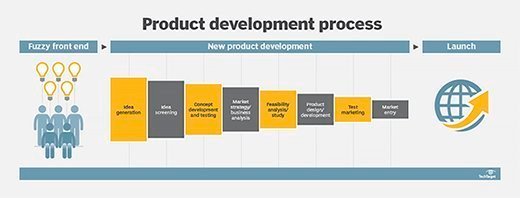product development (new product development -- NPD)
What is product development?
Product development -- also called new product management -- is a series of steps that includes the conceptualization, design, development and marketing of newly created or newly rebranded goods or services. Product development includes a product's entire journey -- from the initial idea to after its market release.
The objective of product development from a business standpoint is to cultivate, maintain and increase a company's market share by satisfying consumer demand. From a customer standpoint, it's to ensure value in the product as a quality good or service. Not every product will appeal to every customer or client base, so defining the target market for a product is a critical step that must take place early in the product development process. Organizations should conduct quantitative market research at all phases of the design process, including before the product or service is conceived, while the product is being designed and after the product has been launched.
Some organizations have product development centers that make products. For example, Alphabet Inc., Google's parent company, launched a product development center in Kenya, Nairobi -- as Alphabet is positioning itself to serve a growing base of internet users.

Product development frameworks
Although product development is creative, it requires a systematic approach to guide the processes required to get new products to market. Organizations such as the Product Development and Management Association (PDMA) and the Product Development Institute (PDI) help organizations select the best development framework for a new product or service. This framework helps structure the actual product development.
Some frameworks, such as the fuzzy front end (FFE) approach, define the steps that should be followed early in the development process, but leave it up to the product development team to decide in which order the steps make the most sense for the specific product that's being developed. The five elements of FFE product development are as follows:
- Identification of design criteria entails brainstorming possible new products. Once an idea has been identified as a prospective product, a more formal product development strategy can be applied.
- Idea analysis requires a closer evaluation of the product concept. Market research and concept studies are conducted to determine if the idea is feasible or within a relevant business context to the company or to the consumer.
- Concept genesis involves turning an identified product opportunity into a tangible concept.
- Prototyping includes creating a rapid prototype for a product concept that has been determined to have business relevance and value.
- Product development requires ensuring the concept is viable and has been determined to make business sense and have business value.
Other frameworks, like Design thinking, have iterative steps that are designed to be followed in a particular order to promote creativity and collaboration. The five components of design thinking are as follows:
- Empathize. Learn more about the problem from multiple perspectives.
- Define. Identify the scope and true nature of the problem.
- Ideate. Brainstorm solutions to the problem.
- Prototype. Weed out unworkable or impractical solutions.
- Test. Solicit feedback.
How to create a product development plan
The product development plan may change, depending on the organization creating it. However, a general plan should include the following steps:
- Identify a product need and business case. Using practices like test marketing and surveys, organizations can gauge interest in a product. This helps ensure the product has a strong reason to be created.
- Create a product vision. This includes coming up with the project's scope, purpose for the product, what it does, who it's for and the product design, while also crafting guiding principles for the upcoming work.
- Create a roadmap. Assess the project as a concept first to ensure good design work, then begin crafting the roadmap. The roadmap aids in identifying what goals should be developed first. Implementation teams create schedules, break down significant portions of the project into sprints and generate iterations of the product.
- Begin implementing the roadmap. Teams can then start implementing the project, following the roadmap. Iterations of the product can be made, reviewed and improved upon. This helps identify weak areas of the product and enables development teams to fix and improve the product.
- Continue with development and assessments. Development teams can work on enhancements and changes to the product. In this step, feedback can be gathered from customers to change the product based on customer needs.
Stakeholders should also be included in these steps to ensure their needs and requirements are being met or addressed.
Stages of new product development
The new product development process consists of the following components:
Idea generation is the continuous and systematic quest for new product opportunities, including updating or changing an existing product. The goal is to generate ideas for new products or services -- or improvements to products or services -- that address a gap in the market.
Idea screening takes the less wanted product ideas out of the running. Unsuitable ideas should be determined through objective consideration, early testing and feedback from consumers.
Concept development and testing is vital. The internal objective analysis is replaced by customer opinion in this stage. The idea, or product concept at this point, must be tested on a true customer base. Further development of the concept can be made according to the feedback. One example of concept development is the prototypes developed by car manufacturers. These concept vehicles are made of clay and shown at auto shows for consumer feedback.
Market strategy and business analysis identifies the product strategy of how to optimally market and sell a product or service. It's comprised of the four P's of marketing -- product, price, promotion and place.
Product. The service or good that's been designed to satisfy the demand of a target audience.
Price. Pricing decisions affect everything, including profit margins, supply and demand as well as market strategy.
Promotion. The goals of promotion are to present the product to the target audience -- increase demand and illustrate the value of the product. Promotion includes advertisements, public relations and marketing campaigns.
Place. The transaction may not occur on the web, but in the digital economy, customers are generally engaged and converted on the internet. Whether the product is provided in a traditional brick-and-mortar business setting or is available through an omnichannel approach, the optimal channel or channels must be determined. This is especially true if the targeted potential customers are to become actual customers.
Feasibility analysis or study yields information critical to the product's success. It entails organizing groups that will test a beta version or prototype of the product, then evaluate the experience in a test panel. This feedback communicates the level of interest in the product by the target users. It also helps determine if the product in development has the potential to be profitable, attainable and viable.
Questions to be answered during feasibility analysis include the following:
- Do you have the labor and materials required?
- What's the price of production, delivery and promotion?
- Do you have access to the right distribution channels?
Product technical design and product roadmap integrates the results of the feasibility analyses and feedback into the product. This stage consists of turning that prototype or concept into a workable market offering; ironing out the technicalities of the product; and alerting and organizing the departments involved with the product launch. This includes research and development, finance, marketing, production and operations. This step should also consist of creating a product roadmap that teams will follow to develop the new product.
Test marketing or market testing is where the goal is to validate the entire concept -- from marketing angle to packaging, advertising and distribution. Test marketing is often performed by offering the product to a random sample of the target market. By testing the entire package before launch, an organization can review the reception of its product before a full go-to-market investment is made.
Market entry and commercialization is the stage in which the product is introduced to the target market. The product is now available to everyone and the product lifecycle begins. The life of the product is shaped by the reception of the target market, the competition and subsequent enhancements to the product.
Product development is an ever evolving and fluid process. In some organizations, there's a dedicated team that researches and tests new products whereas smaller organizations may outsource their new product development to a design team. In midsize organizations, the product manager is often the person in charge of product development. Regardless of which framework is used and who is in charge of new product development, this is just one aspect of the entire product lifecycle management (PLM).
Examples of product development
Taco Bell
Taco Bell has a unique approach to new product development, as its innovation team looks to grocery stores, social media and competitors for its inspiration.
Idea generation. The development team reviews 4,500 new product ideas each year.
Concept development and testing. The team generated 80 iterations of the Waffle Taco before deciding on the final one. Unfortunately, Taco Bell discontinued the Waffle Taco after only a year, replacing it with the Biscuit Taco.
Product technical design. For the Doritos Locos Taco, the product team discovered a process to evenly distribute seasoning on the shells and contain cheese dust in the production process.
Test marketing. Between 350-500 ideas end up in consumer tests.
Market entry. Eight to 10 products end up on the national menu.
Roomba
Another example is the Roomba, an autonomous robotic vacuum cleaner sold by iRobot. An article in New York Magazine profiles the Roomba's creation by its inventor, Joe Jones. This article focuses on the early stages of product development, which ultimately led to the product's launch and success.
Idea generation. The idea for Roomba originated with a do-it-yourself Lego challenge when Jones worked at the Massachusetts Institute of Technology Artificial Intelligence Lab. The challenge was to make something innovative from Legos.
Idea screening. Jones showed initial concepts to companies -- Denning, Bissell and Proctor & Gamble -- but the companies declined to move forward.
Product technical design. After they invested $1-2 million in the project, due to personnel changes, SC Johnson decided to stop supporting the Roomba.
Market entry. IRobot continued to fund the project. In September 2002, less than a year after SC Johnson withdrew financial support, the Roomba launched.
Learn how cloud consultants execute a product development strategy.







